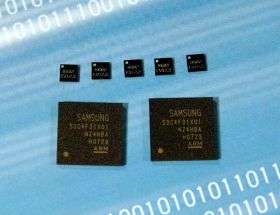Samsung Announces Advanced Multi-standard, Multi-band Mobile TV Chipset

Samsung Electronics announced the industry's first 65 nanometer (nm) multi-standard channel decoder (S3C4F31) and multi-band radio frequency (RF) tuner (S5M8602) chipset which supports multi digital mobile TV standards including DVB-H/T, DAB-IP, ISDB-T, and terrestrial DMB for the multiple standards in the different countries around the world.
"Although a new market, we see high growth potential in mobile TV applications," said Yiwan Wong, vice president, System LSI Division, Semiconductor Business, Samsung Electronics. "With initial product launch targets for the Europe and Asia markets, we are introducing our high performance mobile TV chipset technology with added feature support to serve the needs of the entire mobile TV industry."
Samsung's new multi-standard, multi-band mobile TV chipset integrates a broad range of segment standards. As countries worldwide introduce their mobile TV service standards, this chipset allows end users to choose which broadcasting services they want to use without changing their mobile application.
The multi-standard channel decoder, which transforms the analog signal into digital signal in order to restore the image and audio source, is fully compliant to DVB-H/T, T-DMB, DAB, DAB-IP, and ISDB-T 1 segment standards. Samsung applies its advanced 65nm technology for higher performance and cost effectiveness. The high signal reception rate is a core characteristic, which realizes a smooth mobile TV experience even on high-speed trains.
The multi-band RF tuner, which receives the analog broadcast signal, has a simplified circuit structure by applying a low IF to compliment the conventional zero IF. It is also a general purpose tuner that supports UHF, VHF and L-band commonly used in Europe and the United States. The wide use of the RF tuner compliments the advanced performance of the multi-standard channel decoder.
This new chipset is offered either as two standalone ICs or as a system-in-chip package (SiP) which places together the RF tuner and the channel chip on a single module package.
Samsung provides extensive customer support in terms of software, reference platforms, test solutions and extended component line up such as the application processor. The multi level of support decreases the development time needed for the handset and mobile applications designers to create new mobile TV functionalities.
This new mobile TV chipset requires no external low noise amplifier (LNA) and additional memory ICs, significantly reducing the bill-of-materials (BOM) cost of the total system. The chipset supports Link Layer processing to output fully error-corrected IP datagrams or MPEG2 transport streams.
According to market research firm Strategic Analytics the mobile TV market is expected to reach 12 million units in 2007 and 130 million units by 2011 at a compounded annual growth rate of 67 percent
Samsung's new multi-standard channel decoder (S3C4F31) and multi-band RF tuner (S5M8602) chipset is now sampling with mass production slated for the fourth quarter of 2007.
Source: Samsung





















